
Good sleep is inseparable from good health. In fact, lack of sleep can increase the risks of cardiovascular disease, weight gain, diabetes, or even depression.
Our diet directly influences the quality of our sleep. As such, maintaining an appropriate diet throughout the day helps us to benefit from a good night’s rest.
Alongside nutritionist Anthony Berthou, we explain in this article which types of nutrition to choose in order to optimize your sleep.
Our bodies follow 24-hour rhythms
Almost all of our body’s biological functions are regulated by 24-hour cycles: that’s what we call our circadian rhythm. Our internal clock acts as the conductor that will regulate different function’s circadian rhythms. In this way, it will control the production of the sleep hormone (melatonin) at the end of the day and the awake hormone (dopamine) in the morning, helps lower our body temperature and heart rate at night, and even manage memory consolidation during our sleep.
An important element will help our biological clocks to synchronize with a 24-hour rhythm: light. You see, the retina will capture variations in light, which will effectively tell our brains to secrete the appropriate daytime or nighttime hormones, making us awake or sleepy.
The sleep cycle
Our sleep is made up of a series of approximately 90-minute cycles, ranging from 4 to 6 cycles per night. Each cycle is comprised of different phases:
- Light sleep, which lasts about 20 minutes
- Deep sleep, which is very restorative
- REM (rapid eye movement) sleep, which is the period in which we dream
In order to optimize your sleep, it is important for the moment we fall asleep to align as closely as possible to the moment when we naturally begin our first cycle. Conversely, when there is more time that passes between falling asleep and the beginning of the first cycle, you may feel your sleep wasn’t restorative.
To identify the beginning of our sleep cycle, the body sends us different signals: yawns, irritated eyes, drowsiness, concentration problems… So, it is essential to go to bed at the first indications of fatigue in order to not miss the “sleep train.”
Which food for which meal?
Neurotransmitters are vital to our circadian rhythm regulation:
- In the morning, we need dopamine and norepinephrine, which are going to be our basis for waking up and getting motivated.
- At night, we need serotonin and melatonin, which are responsible for calming down and regulating sleep.
That’s why it is necessary to prioritize a diet that boosts the production of these neurotransmitters at the right times of day.
1) Breakfast
For breakfast, it is recommended to consume a source of animal protein. These will promote dopamine production, which will stimulate us waking up and feeling motivated. Besides boosting our motivation and alertness, this dopamine production will maximize our circadian rhythm regulation. So, we are getting ready for bed as soon as we eat breakfast!
You can, for example, opt for:
 | 1 or 2 eggs |
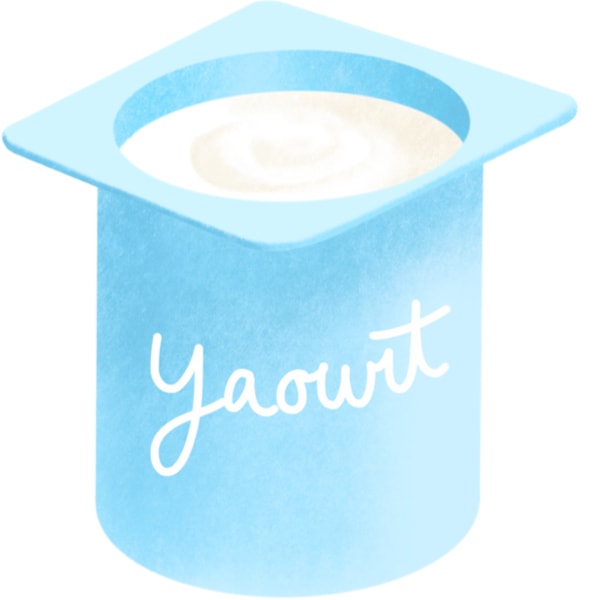 | or 1 yogurt (goat or sheep’s milk) |
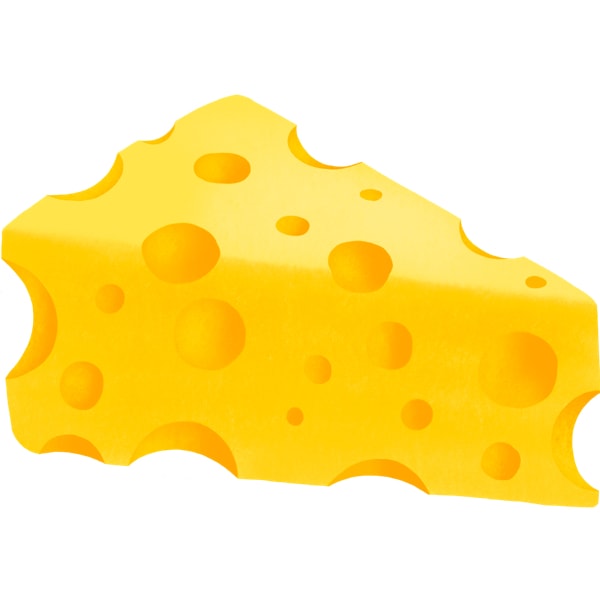 | or 1 ounce of cheese |
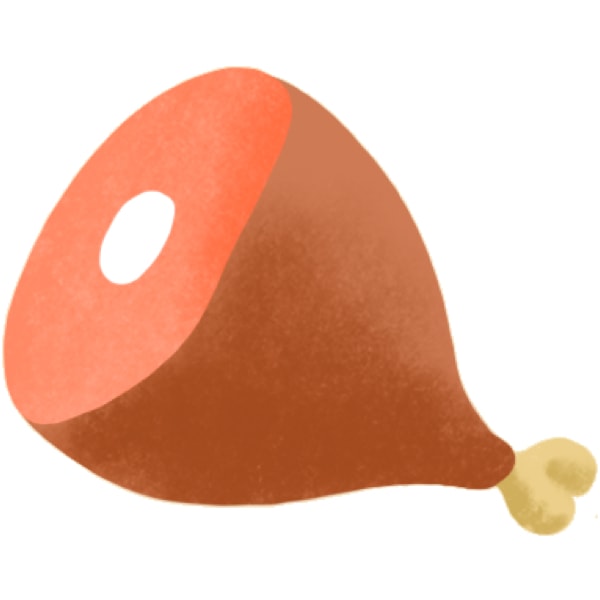 | or 1 piece of high quality ham |
There are also plant-based alternatives, especially nuts (almonds, walnuts, cashews, etc.). Chia seeds are another vegetarian alternative, even though they contain less protein per portion.
👉 Check out our article on the ideal breakfast
2) Lunch
At mid-day, it is also recommended to have some protein – animal or plant – in order have enough energy to last until the end of the day. For example, you can go for:
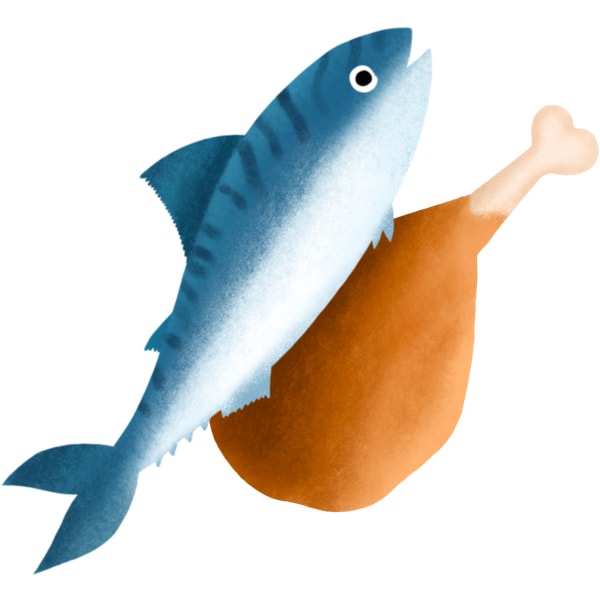 | 4.2 oz of fish or poultry |
 | or 2 eggs |
 | or 4.2 oz of tofu |
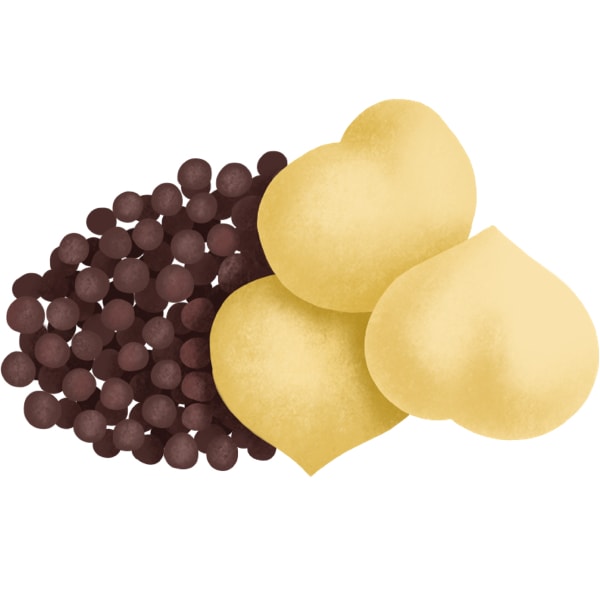 | or 5.3 oz of cooked legumes (lentils, beans, chickpeas, etc.) even if they are not the ideal option because of their carbohydrate content |
These proteins should be paired with fiber-rich legumes will help you feel full and whose low glycemic index will allow for a steady release of energy in the body.
👉 Check out our article on the ideal lunch
3) Snack
For a snack, you can choose a fruit or two pieces of dark chocolate. They will serve as your carbohydrate intake: via insulin secretion, these carbohydrates will promote the production of serotonin, the neurotransmitter which is responsible for relaxation and wellbeing.
Pair this carb intake with a small handful of fatty acids (ideally walnuts and almonds), which will provide tryptophan, an amino acid from which serotonin will be synthesized.
👉 Check out our article on the ideal snack
4) Dinner
In the evening, choose a vegetarian meal without meat, fish, or eggs! In fact, tyrosine – present mostly in animal proteins – promotes dopamine production, a neurotransmitter fuels our experience of waking up and being motivated. If dopamine is ideal in the morning for getting ready, then at night our body needs to produce serotonin, a neurotransmitter responsible for calming down and regulating sleep. This serotonin is synthesized by tryptophan, an amino acid that we find in plant-based proteins: legumes, soy, wholegrain rice, sunflower seeds, chocolate…
Additionally, animal proteins contain amino acids which compete with tryptophan. These amino acids will slow down the tryptophan’s path to the brain; as such, it is not absorbed as well, which affects serotonin production, and therefore, sleep.
Lastly, animal proteins (and cooked fats in particular) put too much stress on our bodies in the evening because their digestion time is longer. The body is going to have to produce more energy, and therefore more heat, to allow this digestion. However, our bodies need to lower their temperature at night in order to sleep.
So, instead, opt for a portion of vegetable protein, as well as for foods which promote serotonin production:
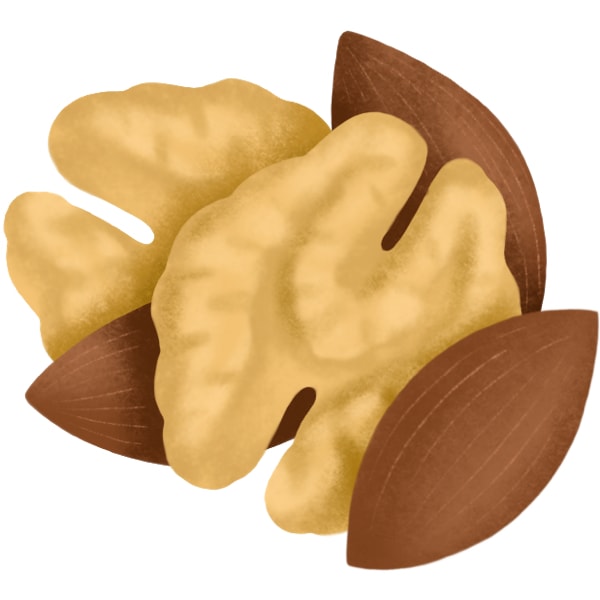 | Walnuts and almonds |
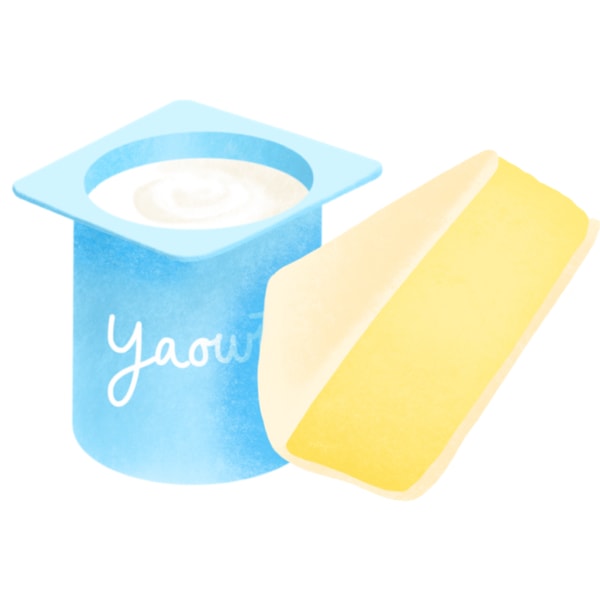 | Yogurts and cheese |
 | Carbohydrates (whole grains or fruits) |
👉 Check out our article on the ideal dinner
Sleep disruptors
Several factors can interfere with sleep and prevent restorative rest.
Dietary disruptors:
 | 1) Coffee Due to its caffeine quantity, coffee stimulates the nervous system for 6 hours after its consumption. To a lesser extent, tea also helps to stimulate our brains. |
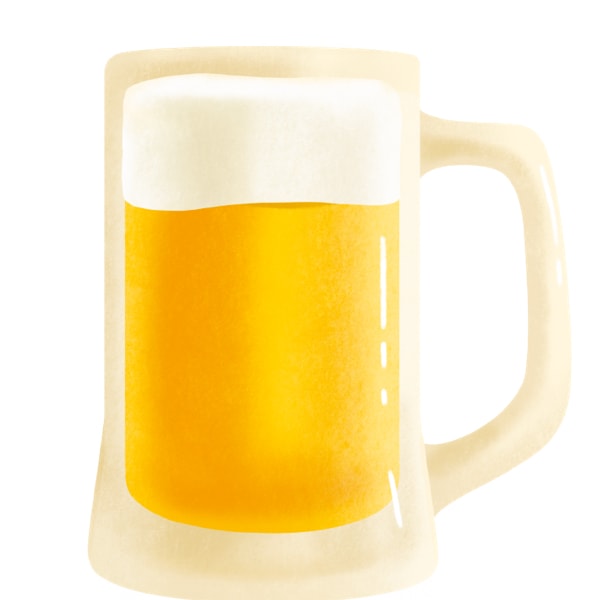 | 2) Alcohol Even though it leads to drowsiness, alcohol also creates a release of adrenaline throughout the night and lowers melatonin levels. |
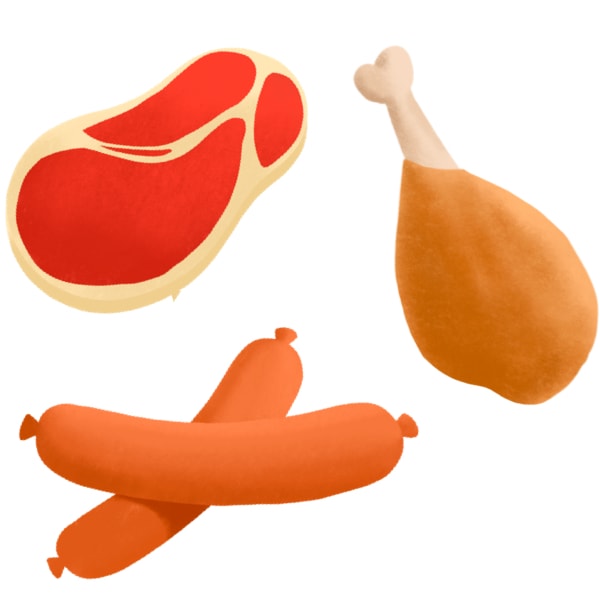 | 3) Excess animal protein at dinner As we’ve seen, it is better to go for vegetable proteins at night, which contain carbohydrates and tryptophan which will allow for serotonin synthesis. |
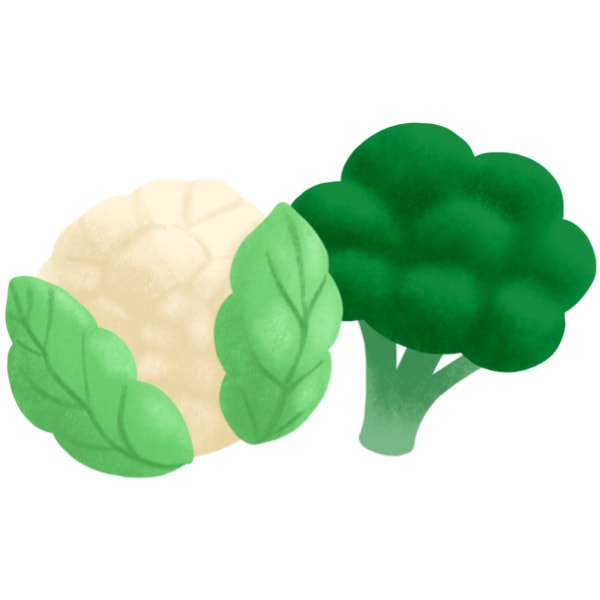 | 4) Cabbage and fermented foods Cabbage and fermented foods like sauerkraut can lead to bloating and therefore reduce the quality of your sleep. |
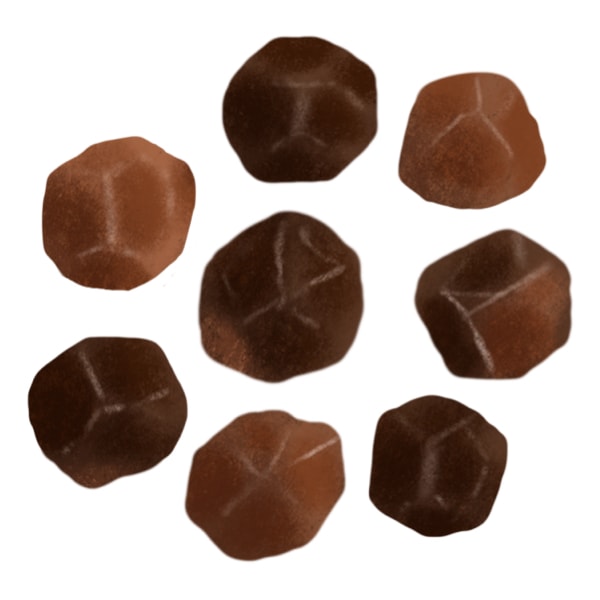 | 5) Spices Spices – like pepper, paprika, or chili –should be avoided at night for people with gastrointestinal sensitivities. |
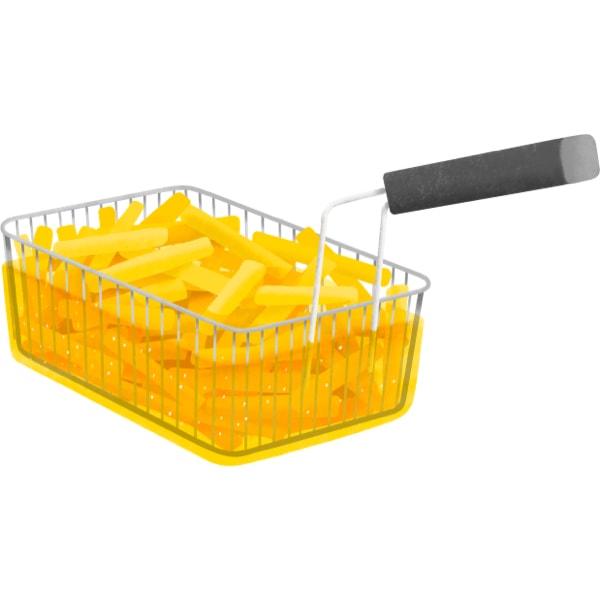 | 6) Fried fatty foods Cooked fats – especially those that are fried – increase digestion time and can therefore disrupt sleep. |
Optimize your magnesium intake!
Magnesium deficiencies are common. These deficiencies can present themselves through different ways which can disrupt sleep: sensitivity to stress, irritability, anxiety, nervousness, night cramps…
Foods with the richest magnesium content are the following:
- Dark chocolate (min. 70% cocoa)
- Nuts (walnuts, almonds, cashews, peanuts, hazelnuts…)
- Legumes (lentils, chickpeas, white beans…)
- Whole grains (buckwheat, oats, rye, brown rice…)
- Sardines in oil
- Seafood
- Spinach
- Figs
Other disruptors:
 | 1) Stress and anxiety Stress and anxiety affect the quality of our sleep: they create difficulties falling asleep and can lead to insomnia. Mindfulness meditation and even self-hypnosis are practices that can help to reduce stress levels before going to bed. |
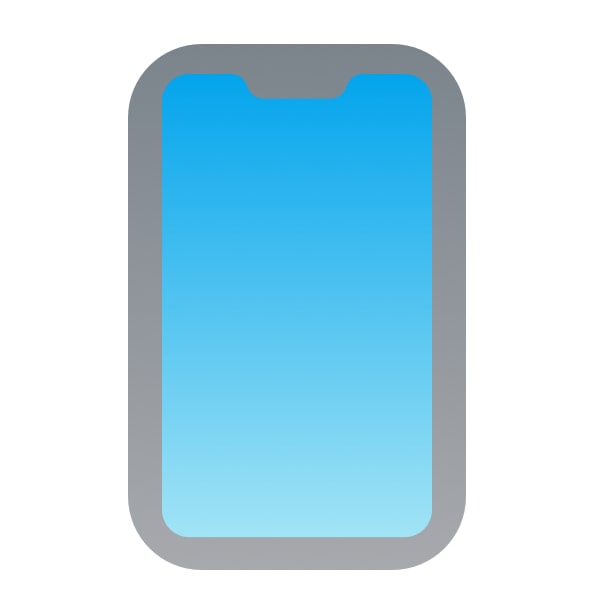 | 2) Blue light The use of screens (computer, tv, phone) at night should be eliminated. These screens produce a blue light which activates up to 100 times more photoreceptors than white light does. As a result, they disrupt our natural circadian rhythm and reduce our sleep time. So, avoid screens as much as possible before going to sleep. The French Agency for Food, Environmental and Occupational Health & Safety (ANSES) recommends limiting the use of LED devices, which are richest in blue light. It is also necessary to fall asleep in a dark environment in order to promote melatonin secretion. |
 | 3) Heat At night, our bodies need to lower their temperature in order to have quality sleep. So, avoid hot baths and showers before going to bed and remember to cool down your room at night to an ideal 62.5°F. |
With all of these tips, wishing you good night’s sleep 🌙
- Knutson KL, Spiegel K, Penev P, Van Cauter E. The metabolic consequences of sleep deprivation. Sleep Med Rev. 2007 Jun;11(3):163-78.
- Hercberg S, Galan P, Preziosi P, Bertrais S, Mennen L, Malvy D, Roussel AM, Favier A, Briançon S. The SU.VI.MAX Study: a randomized, placebo-controlled trial of the health effects of antioxidant vitamins and minerals. Arch Intern Med. 2004 Nov 22;164(21):2335-42. Erratum in: Arch Intern Med. 2005 Feb 14;165(3):286. PubMed PMID: 15557412.
- Colzato LS, Jongkees BJ, Sellaro R, van den Wildenberg WP, Hommel B. Eating to stop: tyrosine supplementation enhances inhibitory control but not response execution. Neuropsychologia. 2014 Sep;62:398-402.
- Ohayon MM. Epidemiology of insomnia: what we know and what we still need to learn. Sleep Med Rev. 2002 Apr;6(2):97-111.
- Markus CR, Jonkman LM, Lammers JH, Deutz NE, Messer MH, Rigtering N. Evening intake of alpha-lactalbumin increases plasma tryptophan availability and improves morning alertness and brain measures of attention. Am J Clin Nutr. 2005 May;81(5):1026-33.
- Møller SE. Carbohydrate/protein selection in a single meal correlated with plasma tryptophan and tyrosine ratios to neutral amino acids in fasting individuals. Physiol Behav. 1986;38(2):175-83.
- Spiegel K, Knutson K, Leproult R, Tasali E, Van Cauter E. Sleep loss: a novel risk factor for insulin resistance and Type 2 diabetes. J Appl Physiol (1985). 2005 Nov;99(5):2008-19.
- Van Cauter E, Holmback U, Knutson K, Leproult R, Miller A, Nedeltcheva A, Pannain S, Penev P, Tasali E, Spiegel K. Impact of sleep and sleep loss on neuroendocrine and metabolic function. Horm Res. 2007;67 Suppl 1:2-9.
- Wurtman RJ, Wurtman JJ, Regan MM, McDermott JM, Tsay RH, Breu JJ. Effects of normal meals rich in carbohydrates or proteins on plasma tryptophan and tyrosine ratios. Am J Clin Nutr. 2003 Jan;77(1):128-32.
- Anses - https://www.anses.fr/fr/content/led-les-recommandations-de-l%E2%80%99anses-pour-limiter-l%E2%80%99exposition-%C3%A0-la-lumi%C3%A8re-bleue
- Article Yuka sur le petit déjeuner : https://yuka.io/fondamentaux/petit-dejeuner-ideal/
- Article Yuka sur le déjeuner : https://yuka.io/fondamentaux/le-dejeuner/
- Article Yuka sur le goûter : https://yuka.io/fondamentaux/le-gouter/
- Article Yuka sur le dîner : https://yuka.io/fondamentaux/le-diner/








62.5 i would freeze…all bodies are not the same..
Cold fresh air is fantastic. Wrap yourself up in lots of blankets. You will sleep better
Excellent advice, I will try to implement some of these suggestions into my daily routine. Especially not eating as much meat protein at dinner time. Thanks
You should have mentioned if eating ham it should be uncured .
Thanks for keeping in touch and for sharing good information.
62 is really cool. I thought I did ours cool at 68. Add a blanket.
Great article!
A Great read that uniquely combines nutritional, physical and mental health a genuine elementry approach without the bells and whistles
Fora healthy lifestyle.
Thank you Yuka. Our family enjoys the very informative app. Excellent information. I already shared the app with my health care provider and many others.
A Great read that uniquely combines nutritional, physical and mental health a genuinely elementry approach
to a healthy lifestyle.
Thanks, all seems like it should help !
This as an excellent article! I am familiar with much of what it says. But it has taken me years to learn- figure these things out.
I’ve read a lot of health holistic newsletters on this topic but your concise, practical guide is by far the best I’ve seen. I especially appreciated correlating it to the science of hormone activity. It makes total sense to me and I’ll be testing the guidance provided through my daily living practices. Thanks for profiling and sharing this perspective for such a systemic growing issue in our society.
I have tried everything to promote sleep. But I barely sleep for four hours. When I awaken, I’m WIDE AWAKE, and I’m appalled that it’s not closer to morning!! I stay in bed an hour or two, trying to get back to sleep. I seldom do. 10PM – 2or 3:00 is a normal night. And yes, my days are awful! I’m not eating anything near bedtime that would create a problem. Melatonin, etc does nothing!
Jeannie, I had the exact same problem until I stopped drinking coffee even in the morning. I live completely caffeine free now and sleep through the night. Maybe caffeine is the culprit.
Thank you.
Thank u very much
How would we get a room to 62.5 degrees F at night? My A/C only goes down to 65 degrees. Would it be to turn it down all the way plus adding fans?
Thank you,,
Sleepless in Vegas
This article is poorly researched and contains bias. A balanced plant based diet remains the healthiest option. And when suggesting cured ham as a healthy food…..removes all credibility. I suggest ham eaters should look at the life of pain and torture of those pitiful pigs. Meat eaters are not animal lovers.
This article was extremely helpful and makes a lot of sense. A couple years ago I switched to a breakfast consisting of animal protein and vegetables & fermented foods. I have felt great throughout the morning as a result.
I can’t wait to implement the rest of your suggestions!
I agree with the previous comments that said that there is too much emphasis on animal products in your recommendations. In particular, we do not need processed meats like ham! Please revise your recommendations to include plant-based options at every meal.
YUKA, you are PHENOMENAL❣️ Is there a way you can make time to do one of these but VEGAN 🙏🏻🙏🏻🙏🏻🫶🏻
I’m so over the narrative about making your house 62 degrees at night. Who has that kind of money to run their AC unit that cold? Oh yeah, living in Florida makes it nearly impossible to get the temperature that low, too.
When we remodeled our house we had our AC/Heating company divide our house into two zones, or for the bedrooms and one for the rest of the house. We have saved a lot in energy costs.
Great diet goes a long way for one’s health. Your comments on food when what and why is perfectly expressed. I have changed my diet to do what the article stated in the last couple of months and my health has improved significantly.
This article was very helpful. I’m definitely going to try the suggestions. Thank you:)
Amazing article on sleep and overall nutrition. Especially the DINNER info! I love Yuka and will continue to support with these significant articles.
I like the Yuka app. It
Has made me more aware of my food choices. It helps
Me
Make
Clean food choices plus I read and love all the food articles! Thank you so
Much!
I love all
Your
Articles on health, food and wellness!
I appreciate you take the time to share this useful information. Yuca is amazing.
Loved your What to Eat to Optimize Sleep article. Good info to follow and thank you so much!
thank you for providing the information about nutrition choices appropriate for each meal time.
Appreciate all the food wisdom you share pertaining to a healthy lifestyle
Nothing new…
We don’t need animal products. On that point I strongly disagree.
Go vegan for the love of animals and our planet, please.
I have to disagree with you. There are a wide variety of people out there. Not all of us can be vegetarians and not all meat eaters. Our bodies are not alike.
Dr Mark Hyman’s book, “Food! What the Heck Should I Eat”, touches on this topic and also helps each of us figure out what a healthy diet looks like for us.
If slaughter houses had glass walls, the world would be plant based. Please truly visualize what those animals endure from birth to terrifying murder. Imagine doing this to a dog or cat
Hi thank you so much I needed this information for the daily menu..
No need for shots / diet drugs just follow the YUKA APP and you will loose weight 100% I lost 35 lbs this year and I’m maintaining the wait just by scanning EVERY PRODUCT I eat that simple people you must stay on this APP.Thanks
This is incredible news. Congratulations!
YUKA is the best!
Excellent article but my problem is sjogrens syndrome which is dry eyes, mouth, sinuses etc So I drink water to late in the evening and wake up every 2-3 hrs to pee all night long. Not sure if there is a cure for this.
Have you tried going wheat and grain free? Dr William Davis has a few books out that would give you more insight on that issue and the connection to wheat and grains. Hope that helps
Have you tried taking Pumpkin Seed oil just before bed? I take 1 teaspoon and I only have to get up once. It has to be a good quality oil, NOT made in China!
Great 👍 information❣️
Great read!
Thx.
Well said so good article
THANK YOU!!
Thanks but just this little food is would starve and im not big
Wow, great information! Thank you!
& I tell EVERYONE about the Yuka app… My family, friends and even people in the grocery store! Thank you for this healthy resource!
Thank you for such an informative post! Love it!!
Excellent article! Sharing with my fellow exercise enthusiasts!
Plant Protein is equivalent, if not superior, to Animal Protein. Please revise your breakfast recommendations to avoid the preference for animal protein. There are many other biochemical responses to animal protein that would actually make plant protein the choice of preference.
Not all of us are alike. We can’t all be meat eaters or vegans. My husband has low blood sugar and food sensitivities. He cannot eat most beans due to their high carb content. Only animal proteins, low glycemic vegetables, and plain yogurt help him stay balanced with his blood sugars throughout the day.
Check out “Food! What the Heck Should I Eat?” by Dr Mark Hyman to custom fit a diet for your individual needs.
Great article. Very good information.
Very interesting
This was great read!
Great advice. Thanks
Very informative with excellent reminders! Thank you so much! I will definitely be sharing this article!
Great info! Thx 😊
Loved this article-thank you!
Great advice thank you
Thank you for the info. Combining your articles with your scanner had been life changing for the better. Thank you for all that your team is doing.
I do a lot of reading on nutrition but this covers areas I’ve never read about before. Enlightening!
I felt the same way! I learned so much from this article even though I have studied nutrition for many years.
Foods Containing Tryptophan
Meats:
Turkey, chicken, beef, and pork are all rich in tryptophan.
Dairy:
Cheese and yogurt, such as cottage cheese and mozzarella, contain significant amounts of tryptophan.
Eggs:
Eggs are another good source of this amino acid.
Nuts & Seeds:
Nuts, particularly pumpkin seeds, are high in tryptophan.
Good information
Thank you
Thank you! This article was very helpful
❤️🙏🏼❤️
How do you pronounce the name of your app … Yuka?
May I ask what are your resources? The reason to my question is you have an outdated knowledge regarding some of these food. For example, tofu is a disastrous food to digest and is harmful to our intestines.
there is a sources link at the bottom of the article
What great information. I’m able to correlate much of this to issues that I have. I can’t wait to make changes.
Thanks for this wonderful article.
Thank you. 🌞
Thank you excellent article
Excellent article! Very informative, especially the timing of meals and what food are beneficial.
Thank you Yuka & Anthony!
Helpful and informative article. Thank you.
Thank you. ❤️
Excellent article. Two comments, I love the information about timing of meals for optimization of sleep, however given the average person does not eat enough protein, are the recommendations suggested sufficient? I am trying to get 100 grams a day, I am not sure I can based on suggested portions. Do you feel high protein intake (vegie or otherwise impedes sleep?
Thank you for this informative information. I definitely need to change some parts of my diet.
It was a good article. Learned some about foods.
KNOWLEDGE IS POWER‼️‼️💯GO YUKA👏🏼keep up the magnificent work ‼️
I absolutely ADORE,APPRECIATE, AND VALUE YUKA 💯💯💯💯💯‼️I use it practically every single day ! GOOO YUKA👏🏼👏🏼👏🏼👏🏼🫶🏻🔥
I always lern something new reading your articles. I have to switch my breakfast with my dinner 😊 – perhaps that’ll help me staying asleep longer too.
I love Yuka. We use it often.
Excellent article. Thank you
What an enlightening app Yuka is and in so many ways.
Hope it maintains its integrity and diligent research in all that it offers. Why doesn’t everyone in all parts of the world have it certainly feel bad for those? So for those of us that do we need to remember the hungry (starving), homeless, and those with no medical accessibility.
Knowledge is sunlight!
Yuka has changed my diet. Thank you
Hello, just a bit of more info.
Cortisol is the main “wake-up” hormone. It follows a daily rhythm called the cortisol awakening response. Levels rise sharply in the early morning (peaking about 30–45 minutes after you wake up) to boost alertness, blood pressure, and energy metabolism. It’s like your body’s natural alarm clock.
Dopamine is more about motivation, drive, and reward. It can make you feel alert and interested in getting out of bed, but it doesn’t have the same predictable morning surge that cortisol does.
So, if we’re being precise: cortisol is the hormone that wakes you up, while dopamine helps you feel motivated to actually start your day.
Also, the tryptophan will be absorbed if you use a bit a sugar in your meal.
Here is a video I did a few Years ago, which the info on it is still 99% correct, hope this helps.
https://www.youtube.com/watch?v=0m5aSA_mVqY&t=46s
Thank you Yuka for educating us on how to fuel our bodies with food!
Thank you for mentioning this Jean, you are correct …I am certified in Functional Nutrition.
I’m having a mess of proper sleep. I understand it’s due to gallbladder removal???😼I take 3mg of melatonin but it’s hit and miss. I do ok during that day, but also understand at 75 I really need guidance, so i thank you. I love my yuka app, and appreciate your input on their behalf. God bless you all. Rachel in crazy California 🫶🏻👍🏻✌🏻☝🏻🙏🏻 I pray things went well in New York ?
Very interesting article.
Very informative/helpful/useful article.
Thank you for taking the time to share this with us 🤗
Thank you so much for the advice and information 🙏🏽
Thank you! Great article! I appreciate all your articles and recipes. I love YUKA and use it just about every day. I enjoy telling people about it in hopes they will start eating healthier. Thanks for caring and all your hard work.
Thank you
Wow – thanks very much for super informative article. Inspired me to read more of your articles!
Love your app and have been a member for a good while now. I have recommended this app to many people, including strangers reading labels in the store!!
Thanks for this. Very enlightening
YUKA has become a staple tool in my home. I’m on the fence with the bioengineered ingredients on many boxed and packaged food items and still remain kosher. How so? We all know that meat and the cells in meat are not healthy for our digestive system. Overall I think that the YUKA app is a brilliant source to inform the masses on what’s poisoning our bodies. Long over due!!
I very much appreciate and love the work you folks do!!! Very informative and easy to understand. I have changed some eating habits and diffinetley purchase better food choices. This article again spotlights sum easy to do suggestions. Thank all the Yuka staff.
I feel so cool using your app when I grocery shop I just love it so many people come up and asked me what I’m doing and I explained Yuka to them, your awesome
I love your app♥️ It has saved my health and happiness knowing I’m eating healthy foods. Thank you very much
Judy
Good info I hadn’t thought of evening protein intake as being disruptive but totally makes sense I wlll try it out! appreciate the article
Thank for the info. Very informative. 🙂
Helpful article ! Thank you .
Thank you Julie wonderful and very important information as always.
Thank you, kindly, for the article and Yuka App.
Much appreciated!
Thank you very interesting article.I think this information can help me a lot
The hormone responsible for waking us up is actually cortisol, the stress hormone, and it is the physiological opposite of melatonin at night. Dopamine does contribute with light exposure, but the primary hormone responsible for basic wakefulness is cortisol. Therefore what is written in the article is misleading, though some things are correct, but everyone reading this should do their own research.
Author please make corrections as necessary.
Yes it’s cortisol, not dopamine.
Super article, informative and great reminders for us all. 🦋🌻
Thank you so much for the advice and information 🙏🏽🙏🏽🙏🏽
Thank you for that information about sleeping better !!!
I am just starting to wake-up in the night.
I will try these suggestions😊
Thanks, I needed that! Great article. I need to get serious about sleep and this tells me how. I’ll do it!
Thank you for sending this article. It was very informative. Sleep is such a blessing.
Excellent article, very informative!
Very good article, a lot of great advices thank you Yuka!
very helpful, don’t go shopping without yuka
Very good information I learn a lot about foods ,thank you
Thanks, very complex article. I thought I knew many things about sleep watching Dr. Matthew Walker, Andrew Huberman, Dr Sleep Michael Breus, etc. but your approach was different ( foods obviously since you are Yuka + circadian rythm ). Nice one, cheers
Great tips on sleeping
Very informative as usual. App has been, and continues to be very useful. Thanks
Very useful and informative information. It is good to know what food promotes sleep and hinders restful sleep. I will apply the knowledge I’ve just learn to help aid restful sleep. This app is great. Thanks yuka🙂
This was very interesting. I learned a lot about what I’m doing right and wrong. Thanks for all the info.
Good article. Very informative.
Great article!
Thank you for the information, I knew about some of the food but not all I do sometime have problems sleeping, I need to stop looking at my tablet screen 2 hours before bed or do not look at screen.
Excellent, such a wonderful resource you have created, loved watching your you tube video on how you started.
Many thanks for your hard work and dedication.
Shirley
Thank you very much for creating tthis amazing device which is very helpful for me to choose a good and healthy product for my daily life.
More information on type 2 diabetes please
Very informative, but would like a bit more advice for type 2 diabetes, as carbs are not good for diabetes, also to use your scanner to help with diabetes.
many thanks Barry
Most interesting content for good sleep.
I would like to know the safer sun screen to use .
Thankyou so much for your wealth of knowledge and wisdom, it’s what we need nowadays…someone helping other people, instead of themselves!!
Very interesting and informative article. Thank you very much.
Excellent article thankyou.
Many thanks,
From a 71 year old CFS/ME/FMA Sufferer,in the UK!!… 🙂
It would’ve been far easier to tell people to switch to a carnivore diet eating beef, butter, bacon & eggs !
Thanks for the information it’s very helpful will try to implement some and see if it works
I have recently knocked red wine on the head as my go to evening routine whe sitting down.
Two weeks of none alcohol evenings is starting to pay off. Perhaps others might find that helpful too. Alan Carr’s Easy Way was immensely motivating for me.
I stopped drinking wine on 25th July along with cheetos and crisps. I’ve list 14lbs today 25th August
How does this fit with the need to eat higher protein, to combat falling muscle mass, as we age. If I didn’t use fish or chicken at dinner I would struggle to eat sufficient per day. My weight is around 65kg. Thanks
Very helpful thank you very much 😊
Thanks very helpful information very helpful tips.
Some useful info, but lots of confusing gaps. E.g. is this saying we should avoid carbs (cereals, bread, etc.) at breakfast – indeed at all times except snacks? And avoid coffee at breakfast too? And that having dinner late is ok? And a big dinner is ok too?
Interesting article. However, you don’t seem to cater for vegetarians. There is too much focus in animal derived nutrients which I find very disappointing, particularly given the fact that more and more people pit a lot of emphasis on plant based food.
Very interesting article especially as I don’t sleep very well will certainly be trying out these recommendations.
Very interesting article, I’m trying this, thank you 😊
A superbly written article. Very informative and easy to read.
Thanks Julie, most helpful
Very helpful article. Thank you! I didn’t realise I was doing so many things wrong…..no wonder I’ve struggled with sleeplessness for years. I have a lot to think about having read this article & will definitely try some things suggested. Thanks again.
Hello Yuka,
Thanks for the understantable and the informative article..
Happy to follow you..
Very interesting particularly around what to eat and drink in the evening. Definitely learned something new!
I have certainly learned something today
Great article, thanks.
Very informative, thank you
Great article, well written and very informative. Thank you Yuka.
To Heidi’s comment about why having hot baths IS good before bed, sort of half agree with you but I was told ‘ Yes do have warm baths but at least an hour before bed to relax and then the body cools down in response, prepares us to sleep well but if you have it immediately before bedtime this natural response does not happen and we are over-stimulated which is not good for sleep’ so I get where Julia is coming from
Another excellent informative article. I thought I knew quite a lot about sleep but this is clear, concise and well presented and I learnt some new things from reading it. Thank you, and well done.
Splendid info – we can now make an informed chit xe to Pinole e our sleep!
Thankyou
Thank you for your useful information, Yuka. I usually sleep fairly well but have to wake up at least 3 times in the night (2 if I’m lucky) to go to the loo, as I obviously have a weak bladder. Does this necessity have an adverse effect on me?
Inordinate knowledge unfolded with Positive impact enhancement to health, life and living.
Very interesting and informative. I hadn’t realised eating fermented or broccoli would affect my sleep. A healthy gut is everything. Thank you Yuka
Very informative, practical and useful information.
I like the app and have shared it with friends and parents of young children.
Thank you.
A very interesting and easy to understand article. I don’t have any problems sleeping, my issue is with awakening (I sleep 9-10 hours per night). I will share this info with my partner as he suffers greatly with falling and staying asleep. Please keep these articles coming.
This is a great read. Would you consider adding the vegan options more clearly?
Huge thanks for sending this – I have been struggling with sleep for a while but never thought about avoiding animal produce and crucifiers at night, something that I eat almost every night. I love your app and talk to everyone about it!
Hi. Take a look at ‘Why we Sleep’ by Matthew Walker for why hot baths ARE good for lowering your body temperature before bed and conversely, why cold showers are good for waking you up.
This is true. Personally I avoid hot baths though, as this, the same as hot showers, can burst capillaries and damage the skin.
Who would want a hot bath nowadays? It’s not healthy, it’s a waste of water and as far as I’m concerned it’s a waste of time. I absolutely spend a maximum of four minutes in the shower with the water running hot for half the time, finishing off with a minute of cold water.
Thank you for information I have been suffering terrible with sleep issues
for many reasons but perhaps did not think maybe food contributed
certainly need to put this into prospective
Great advice . Thank you
I’m loving the Yuka app and have shared it with friends and family who all are using it too. It would be great if it could tell us what products are cruelty free if possible?
I’ve thought this too. For example, with suncream, it gives alternatives which score better on Yuka, but they’re not cruelty free, so I’ll use something which is worse for me, if it saves animals from torture
You do excellent work, thank you so much.
Exactly what I needed to read thank you
Brilliant I use the app when I shop Thank you
Excellent article thank please more of this
Iv now got half the north east of England using this app lol 😆 friends family etc they love it
me too. i live in the north east and i am spreading the word every chance i get
Very interesting article. Will make me think before I wink.
Brilliant helpful article ! Well done
Great article, it’s a shame it is promoting animal protein. We should all be focusing more on wholesome plant based foods for our own health and for our planet! Meat and animal products have been linked to many of the leading health problems, including increased risk of cancer (processed meat products are classed as carcinogen by the WHO) and cardiovascular diseases. People need to do their own research and they will soon find that going wholefood plant based is the best you can do for your own health.
Thats your opinion and you are entitled to it but try not to try and insist people follow it. There had been a massive shift in the last few years . It is also possible to buy very good quality animal products that do not contain any nasty chemicals that impact on our health. Many so called healthy plant based products also contain disruptive chemicals
Some plant based products are ultra processed, but at least they’re free of torture
Thank you for pointing this out, Deb and you are absolutely right, plant based foods can be incredibly unhealthy. However, vegetarianism and veganism isn’t always just about healthy eating. A lot of people choose plant based diets for ethical reasons so for those animal protein of any kind is really not an option.
I agree; who would eat Quorn the most processed food source ever! The thought of it makes me feel ill! I like eating natural food whatever it’s source and in any case reading the article it does suggest not eating animal based foods as your evening meal…
This is so subjective. I have friends who can have a double shot of coffee & sleep like a baby. I on the other hand follow a fairly strict diet & am a terrible sleeper.
I love the Yuka app and often recommend it to friends. The additional information you provide, as here, is also much appreciated and very helpful, thank you.
Its great how it can give us the opportunity to make informed decisions. Ive been through every loaf of bread in the supermarket ( yes very sad ! ) and found only one above 80/100. Also protein drinks …. there is only one thats any good out of all brands . Thats such an advantage if you want to eat without chemicals
Then I am very sad as well! I’m always scanning, I’m sure people are wondering what on earth I am doing! I would be interested to know which supermarket bread is above 80 ……
“This is incredibly valuable and insightful! I really appreciate the effort put into sharing this information. It’s definitely something I’ll keep in mind moving forward. Thank you for providing such helpful content, definitely I will put in practice !”
Thank you for imformation.
Very iseful. Thank you!
The latest advice is to eat 3 times a day 30g of protein at each meal, 30g fibre per day and 30 different plants per week. Finish your last meal at least 3 hours before bedtime to optimise sleep. For those in the rest of the world who use Celsius, 62.5°F is 16.9°C
I’m surprised at Yuka for recommending ham for breakfast, when the WHO lists it as a group 1 carcinogen.
Depends where you buy it . Anything from a supermarket is contaminated. You have to do your research and be prepared to pay more. I can recommend the Ham & Cheese company .
I wanted to take a moment to express my gratitude for the information you provided. It has proven to be extremely helpful and significant to me. The timing of its arrival was fortuitous, as it aligns perfectly with the practices I am currently implementing to manage my anxiety and stress levels.
Your insights have confirmed that I am on the right path regarding my efforts to improve my sleep quality and ensure that my body and mind receive the necessary nutritional values required for optimal functioning. It is reassuring to know that I am taking the appropriate steps towards better health.
Thank you once again for your support and for sharing this valuable information. It is greatly appreciated.
Warm regards,
very good information
I’m very impressed with my Yuka app as iv learned more about foods and I eat much better
Thank you
Brilliant article, thank you
Very interesting article!
Exceptional and informative article as always!!
Many thanks!!
Denis.
Having a hot bath lowers the body core temperature which helps with sleep. You wouldn’t have a cold shower before bed would you?
Always found hot baths at night bad for sleep
In the summer I have cool/tepid showers before bed. This helps me. When it’s not hot out I take a warm soapy shower with very dim lighting. This completely relaxes me and I feel fresh and clean.
Why are the sub articles in French?! Interesting article though.
Thank you .
Good explanation .
Always read it,and try to follow want you say,thanks for sun lotion advice,will follow thankyou
Thank you for this it is great to know.
Very insightful, thank you guys!
I follow most of this ,but the wine in the evening let’s it me down unfortunately.
Very interesting and wonderful advice but most of the links to the ‘recommended meals’ are in French, 🤔
Don’t get married and you will live longer and in the morning you will have a smile all day 😊 I use your app all the time so keep it up thanks you till next time
Thanks for the info on sleep, very interesting and informative.
Thanks for the information. I have learnt alot from it.
Very informative
Thanks
Fantastic and interesting report. You learn and enrich your knowledge about different health topics.
Directionally sound but oversimplified. No animal protein at night? This is a bit too categorical. Very heavy red meat dinners can impair sleep in some, but light, lean protein (fish, eggs, even chicken) often improves satiety and stabilises blood sugar overnight. The idea that animal protein “blocks” tryptophan is based on small mechanistic studies, not real-life meals. The dopamine/serotonin narrative is neat, but our brain chemistry isn’t that linear. Sleep quality depends as much on meal timing, blood sugar balance, and gut comfort as it does on specific neurotransmitter precursors. What actually works best for sleep (from strongest evidence):
Don’t go to bed hungry → a small snack (protein + carb, e.g. yogurt with berries, oatcake with nut butter) can prevent 3am wake-ups.
Avoid huge, late dinners → especially very fatty or spicy ones.
Prioritise low-GI carbs in the evening → lentils, beans, sweet potato, whole grains — they help serotonin conversion and calm blood sugar swings.
Magnesium-rich foods → leafy greens, seeds, nuts, cacao can promote relaxation.
Consistent timing → your body craves routine even more than perfect food combos.
Lovely article, Julie — well constructed & presented!
Take care,
Dorian
Fabulous, well written and informative article
I’m surprised and disappointed to see you advising people that they ‘must’ consume animals. It’s no secret that we can get everything we need from plant sources, and it’s essential that we shift to a plant-based food system.
We have no need and no right to enslave and exploit other sentient beings, for food or anything else.
Even if it wasn’t morally and ethically repugnant to do this to others, animal agriculture is the leading cause of species extinction, ocean dead zones, water pollution, habitat destruction, deforestation & human-wildlife conflict, and is one of the leading causes of our climate emergency.
It’s breathtakingly ignorant and irresponsible to advise people to eat animals. This should be corrected in the original piece.
Totally agree
Totally disagree.
Totally agree, was dismayed that outdated view/promotion of eating animal products….
Healthy plant based diet should be advised..
I think you’ve misunderstood the article. It doesn’t tell anyone that eating tasty animals is a ‘must’.
It recommends it, which it shouldn’t.
That’s your opinion Dylan, and you’re entitled. To it. As a lifetime member of PETA (People Eating Tasty Animals) I disagree.
Concise, informative article, but completely agree with Dylan. We need to be advising people on the best plant based alternatives to animal protein. (I’m vegetarian for 50 years and in excellent health)
That’s your opinion Dylan, and you’re entitled. To it. As a lifetime member of PETA (People Eating Tasty Animals) I disagree.
I think you are being disrespectful to the extreme.
I think it very important to allow people to make their own decisions . Personal opinions are very important but try to avoid pushing your personal agenda to everyone else as it can appear aggressive and bullying and we have had enough of that agenda and their violent methods . It does not persuade people . The Yuka app has been transformative for many and i personally object to a minority trying to change the agenda. Stick to your lifestyle but allow others to do so as well .
I agree. It’s disappointing and outdated to be promoting animal protein as part of a healthy diet.
I love the app but this is disappointing.
Thank you for sharing your perspective. I respect your views on plant-based living, though I don’t share the conclusion that consuming animal products is either unnecessary or inherently unethical for everyone.
While it’s true that many people can meet their nutritional needs on a well-planned plant-based diet, it’s also the case that others find animal products to be the most reliable or practical way to meet certain nutritional requirements. There is no single dietary approach that suits all people equally well, and acknowledging this isn’t the same as ignoring sustainability or ethics.
I also believe it’s important to consider nuance in discussions about food systems. The environmental impact of animal agriculture varies greatly depending on farming practices, geography, and scale. Regenerative, small-scale, and pasture-based systems, for example, can support biodiversity and soil health rather than destroy them.
In short, I don’t agree that advising the inclusion of animal products is “ignorant” or “irresponsible.” I see it instead as recognising human diversity, cultural traditions, and the complexity of nutrition and sustainability.
It’s only advice, not a direct order and from a nutritional point of view not a moral one. You don’t have to follow the advice if it goes against your principles. However many people will find the article interesting whether they eat animal based products or not.
This plan has worked for me! I have used prescriptions to fall asleep, woke up after 3 hours, wide awake and starving. I have used herbal supplements, no sleep. We now eat dinner for breakfast Sunday-Friday and I sleep. We do like a sit down “normal” dinner on Saturday night or when at a friends house. I have suffered from insomnia for 50 years and this simple change on when I eat animal or heavy proteins has literally changed my life. No western medical doctor has ever suggested this change. Thank You Thank You Thank You
When I click on “ideal dinner” option, it links to an article in another language and I speak English.
If you scroll to the bottom of the article and change the language to EN for English, it is the correct article.
Am I understanding that it IS good to eat cheese and yogurt in the evening to produce serotonin? Would these be vegetarian products and not dairy?
A vegan eating chickpeas and brown rice for dinner might line up with sleep science… but if they’re having a tub of processed coconut yogurt dessert, they’re in the same boat as someone else with a late-night kebab! Fake yogurts, fake cheeses, oat/almond milks is often ultra-processed with added sugars, gums, and oils, not exactly sleep-friendly.
As with the recommendation to eat ham – you need to look around and do some research and you will actually find very healthy vegetarian and vegan foods – and tasty as well.
Very good information, all my Health questions were answered especially what I should eat before going to bed, I hope it will change my sleep pattern
My sleep pattern changed within 4 days. I love this plan and will never go back to the previous ways. We do cheat on Saturday night as we can sleep in on Sunday. We cheat if at a friends house, otherwise we stick to the plan.
Excellent article- the information and the way it was put together
That made a lot of sense. Thanks!
The colder, the better for me! I have found that my most comfortable sleep temperature for my bedroom is 59 degrees! I sleep like a baby!!
NIght temperature at 62.5? I turn our thermostat down to 73 at night, and still need a sheet, a comforter, and two blankets to keep from freezing. Maybe that’s because I live in Texas, and am used to 100° temperatures during the day! ¯\_(ツ)_/¯
I would have trouble with 62 degrees as well. My lowest would be 67-68.
This the absolute best article I have ever read on sleep – thank you